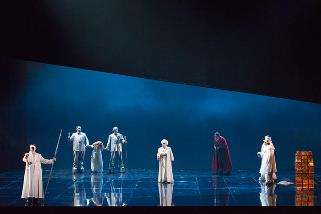|
Back
An Uninspired Rheingold Tokyo
Opera Palace, Tokyo Opera City
10/01/2015 - & October 4*, 7, 10, 14, 17, 2015
Richard Wagner: Das Rheingold
Jukka Rasilainen (Wotan), Hiroshi Kuroda (Donner), Junya Katayose (Froh), Stephen Gould (Loge), Hidekazu Tsumaya (Fasolt), Christian Hübner (Fafner), Thomas Gazheli (Alberich), Andreas Conrad (Mime), Simone Schröder (Fricka), Fumiko Ando (Freia), Christa Mayer (Erda), Noriko Masuda (Woglinde), Kaori Ikeda (Wellgunde), Kasumi Shimizu (Flosshilde)
Tokyo Philharmonic Orchestra, Taijiro Iimori (Artistic Director and Conductor)
Götz Friedrich (Production), Gottfried Pilz (Scenery and Costumes), Kimmo Ruskela (Lighting)

(© Masahiko Terashi/NNTT)
The New National Theatre Tokyo (NNTT) opened its fall season at Tokyo’s Opera Palace with a lackluster production of Wagner’s Das Rheingold. Borrowed from the Finnish National Opera, this 1996 production is one from the last years of Götz Friedrich (who died in 2000). This was not taken from his famous, so-called “Time Tunnel Ring” –a political statement about mankind’s propensity to destroy itself through nuclear war or communism–but a trimmer and somewhat stylized version.
The NNTT’s production trudged along like a series of set pieces that lacked a unifying pulse and musical line. Although the voices were strong, conductor Taijio Iimori failed to inspire the orchestra and bring the work to life. The musicians, particularly in the first half, were on autopilot and the brass an embarrassment. The static, almost non-existent stage direction did not help. Only a few moments brought sizzling excitement–an intense, edgy-voiced Thomas Gazheli as Alberich delivered a riveting curse scene; dark and full-bodied Christa Mayer as Erda a harrowing warning to Wotan; and the orchestra, which began to play better after the first half, provided captivating transitional music between scenes three and four. The ending, however, just fizzled–no sense of relief, awe or foreboding. The audience’s response was equally tepid.
The other singers were as exceptionally strong. Jukka Rasilainen was solid-voiced as Wotan, Simone Schröder velvety-voiced as Fricka, and Stephen Gould (although not as nimble and effervescent as the usual Loge) smooth and lustrous-voiced. The bass of Hidekazu Tsumaya’s Fasolt was full, deep and spine tingling and the Rhinemaidens deliciously melodious and seductive.
The sets were handsome enough. The first two scenes were anchored by spare geometric shapes; the last two by an upper-level stage maneuvered by a hydraulic lift. In Scene Three the Nibelung miners with their headlights scurried about behind a garishly lit facade of an amusement park or peep show, while Wotan and Loge communed on the bleak upper level. Cool lighting, bright colors and eclectic costumes rounded out the visual aspect.
Gratuitous Euro-trash touches informed most the characters. Stephen Gould’s Loge was a cocaine-snorting, suited businessman wearing a red, floor-length cape; Hiroshi Kuroda as Donner and Junya Katayose as Froh appeared as Sir Thomas Moore and Pulcinella (both in white as were Wotan, Fricka, and Freia). In Scene Two Fasolt and Fafner were made out as what appeared to be soldiers or moon-walkers, but by Scene Four had morphed into white-suited dandies. The Rhinemaidens wore contemporary ball gowns with contrasting capes.
Props were skimpy. Painted white teeth on a curtain represented the dragon and a small, golden globe or basketball the Rheingold (difficult to tell which from the second last row of the main floor). The globe was later smelted into a stack of enough gold bars (and the ring of course) to hide Freia.
The Tokyo Philharmonic Orchestra, which participates in many opera productions, could have performed better with a more inspiring conductor. In just a one-week period I heard this orchestra accompany THREE operas in Tokyo. Earlier in the week, the orchestra was exceptional in Die Liebe der Danae under the baton of Jun Märkl; as they were later in the week in Kashchey the Deathless, conducted by Mikhail Pletnev (see subsequent review).
The NNTT plans to perform Die Walküre next season.
NNTT’s website
Earl Arthur Love
|